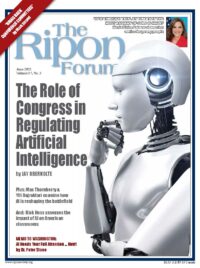
Artificial intelligence (AI) has already begun to revolutionize numerous industries, from healthcare to finance. However, one area that has yet to fully embrace the potential of AI is lawmaking. The U.S. Congress, for example, still relies on traditional methods of information gathering and analysis to make important policy decisions. However, the integration of AI into the legislative process has the potential to transform the way laws are made, improving efficiency, accuracy, and transparency.
One of the most significant benefits of AI in lawmaking is the ability to process vast amounts of data quickly and accurately. This is particularly important when it comes to analyzing data related to complex policy issues. For example, imagine that Congress is tasked with developing legislation related to climate change. In the past, lawmakers would have had to manually sift through mountains of data related to carbon emissions, global temperature trends, and other relevant information. However, with AI, this process can be significantly streamlined. Algorithms can be developed to analyze data from a wide range of sources, including scientific studies, government reports, and public opinion polls. This data can then be used to inform the creation of policy proposals, making the lawmaking process much more efficient.

One of the most significant benefits of AI in lawmaking is the ability to process vast amounts of data quickly and accurately.
Another potential use of AI in lawmaking is in the development of predictive models. By analyzing data related to past policy decisions and their outcomes, AI algorithms can help predict the likely consequences of new legislation. This can be particularly valuable when it comes to assessing the potential economic impact of new policies. For example, AI could be used to model the effects of proposed tax reforms, allowing lawmakers to make more informed decisions about how best to structure the tax code.
In addition to improving the efficiency and accuracy of the lawmaking process, AI can also help increase transparency. By analyzing public data related to lobbying and campaign finance, AI algorithms can help identify potential conflicts of interest and other ethical concerns. This could be particularly valuable in a political climate where concerns about the influence of special interests on the legislative process are high.
Of course, there are also potential downsides to the use of AI in lawmaking. One concern is that reliance on algorithms could lead to a lack of human judgment in the legislative process. There is also the risk that AI could be used to perpetuate biases and inequalities, particularly if the algorithms used are not properly designed or tested.
Another potential use of AI in lawmaking is in the development of predictive models. By analyzing data related to past policy decisions and their outcomes, AI algorithms can help predict the likely consequences of new legislation.
Despite these potential challenges, the benefits of AI in lawmaking are significant enough that it is likely that we will see increased integration of AI into the legislative process in the coming years. Already, we are seeing examples of AI being used in a limited capacity in Congress. For example, the Congressional Research Service (CRS) has developed an AI-powered tool that allows lawmakers and staff to quickly find relevant information on a wide range of policy issues.
Looking ahead, it is likely that we will see more extensive use of AI in the lawmaking process, particularly as the technology continues to improve. This could include the development of AI-powered policy recommendation systems that suggest potential legislative solutions to complex policy issues. Additionally, AI could be used to analyze the impact of new laws once they are enacted, helping to ensure that policies are achieving their intended goals.
In conclusion, the integration of AI into the lawmaking process has the potential to significantly reshape the way laws are created and implemented. By improving efficiency, accuracy, and transparency, AI can help lawmakers make better-informed decisions and develop policies that are better aligned with the needs of their constituents. While there are certainly challenges associated with the use of AI in lawmaking, the potential benefits are significant enough that it is likely that we will see continued experimentation with this technology in the years to come.
The above article was generated in less than a minute by ChatGPT on April 23, 2023 in response to the following prompt: “Write a 500 word article on artificial intelligence and how it can reshape lawmaking in the U.S. Congress.”




